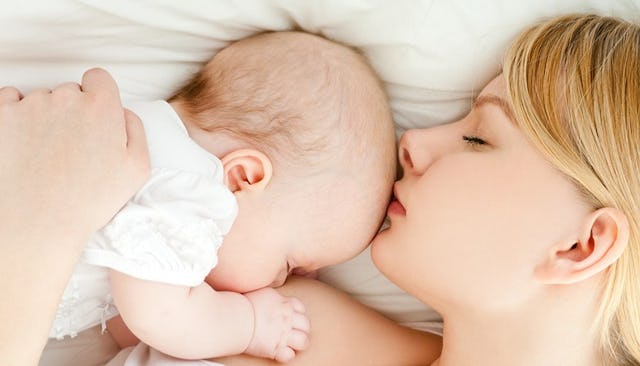What The Heck Is 'Breastsleeping,' And Why Can It Be A Lifesaver For Breastfeeding Moms?

You may have heard the internet buzzing with the term “breastsleeping” and wondered what the heck it was. Nope, it’s not a new breastfeeding pillow, nor is it a term invented by a wild-eyed sleep-deprived mom. It’s actually a phrase coined by a sleep expert named James McKenna, PhD, who is the director of the Mother-Baby Behavioral Sleep Laboratory at the University of Notre Dame.
McKenna is an anthropologist and world-renowned expert on infant sleep. He definitely leans on the “crunchy” side of things, publishing many articles and studies on the benefits and safety of co-sleeping. One of his latest articles, published in the peer-reviewed pediatric journal, Acta Paediatrica, and co-written with Lee Gettler, is called, “There Is No Such Thing as Infant Sleep, There Is No Such Thing as Breastfeeding, There Is Only Breastsleeping.” That article is where the phrase “breastsleeping” originated.
Breastsleeping is basically exactly what it sounds like. It’s breastfeeding your baby while you both sleep (well, hopefully both of you!). McKenna believes that sharing a bed with your breastfeeding baby is natural, normal, and healthy. He says that breastfeeding moms are physiologically attuned to their babies, and that a breastfeeding mother is likely to be in a lighter sleep for much of the night so that she is apt to rouse if her baby is in danger.
McKenna explains that breastsleeping is just really good for breastfeeding. It ensures that a mother’s milk supply is high because babies who sleep with their moms are more likely to breastfeed frequently at night, and it makes it more likely that a mom will breastfeed for a longer duration. “[B]edsharing is known to double and even triple the number of breastfeeds per night,” writes McKenna, “and the positive relationship between extended breastfeeding and bedsharing is now firmly established, the resultant benefits conferred by the practice are clearly numerous.”
Now, you might be thinking: “Well, that’s all fine and good, but I need my sleep, so why would I choose a sleeping arrangement that makes it more likely for me to turn into all-night open milk bar?”
Well, McKenna argues that breastsleeping actually ensures more sleep for moms because even though your baby might wake more frequently, your baby will be easier to settle back to sleep— and of course, you won’t have to get out of bed to tend to your baby.
And what about safety? Isn’t sharing a bed with an infant supposed to be dangerous?
While the Academy of American Pediatrics advises against bed-sharing, stating that babies should sleep in the same room with their parents for the first six months, but not in the same bed, McKenna has a different take.
First, McKenna emphasizes that he only recommends bed-sharing for breastfeeding families because bottle-feeding moms aren’t as likely to wake up at the littlest sound or commotion the way breastfeeding moms are. (This is not meant to be an attack on feeding or sleeping choices.)
McKenna points to research showing that most breastfeeding moms take their babies into bed at some point — whether it’s all night or at some point in the middle of the night or early morning. He believes that health professionals should teach families how to make bed-sharing safer instead of issuing a categorical “no” to it. Additionally, he says that studies have found that bed-sharing is not a significant risk if done safely, and that after 3 months, bed-sharing is actually protective.
Okay, then, so what does all of this mean to the average breastfeeding mom? Breastsleep or else you’re going to lose your milk supply? Breastsleep or else you’ll cause harm to your baby? Breastsleep or you aren’t a “real” breastfeeding mom?
Umm, of course not! When articles like this come out, the best advice I’ve heard is: “Take what you need, and leave the rest behind.”
I personally found breastsleeping invaluable when I had babies. Hell yes, they woke to nurse a whole freaking lot, but after a few weeks, I was able to latch them on in the dark, and we’d both go back to sleep fairly easily. It wasn’t always rainbows and roses — being that close to your milk source all night can cause some pretty frequent waking, and I would be lying if I said I was fine with it all the time.
But it definitely was what worked for me, both in terms of making sure breastfeeding went well and getting to experience an inordinate amount of warm fuzzies with my babies. It was also huge for me not to have to get out of bed to nurse my babies. I couldn’t have survived all the waking any other way.
For those breastfeeding moms who really don’t want to sleep with their babies, or who only want to do it sometimes, there is obviously no definitive reason why you must breastsleep.
However, if you are on the fence, worried about safety, becoming more sleep-deprived, or something else, it’s nice to know that there are sleep experts out there who deem it safe (when all the safety guidelines are followed), and who say it might actually cut down on your sleep deprivation.
As for when your baby will stop sharing a bed with you, I can’t tell you when that will end (my 4 year-old still spends about half the night snuggled into bed with me). But the truth is that no child is still breastfeeding or sharing a bed with their parents by the time they go off to college, so there’s definitely that.
This article was originally published on